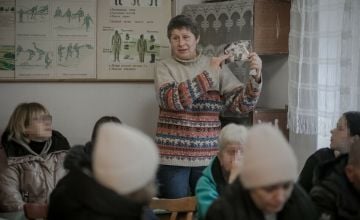
Knowledge Hub
The cycle of poverty refers to a self-perpetuating pattern in which individuals or families experience poverty and find it difficult to escape from it. It involves a combination of economic, social, and psychological factors that create barriers and keep people trapped in poverty across generations.
The cycle tends to reinforce itself and make it challenging for individuals to break free from poverty's grip.
The key elements contributing to the cycle of poverty
In 2024, 712 million people are living in extreme poverty, a marked increase from 2020 spurned by the impacts of COVID-19, conflict and extreme weather. For those affected, circumstances fuel a cycle of poverty that they're unlikely to break on their own. Many have inherited this cycle from their parents. Many will pass it on to their own children.
The key factors pertaining to the cycle of poverty are:
Limited access to education
Poverty often leads to inadequate access to quality education. This can result from various factors such as unaffordable school fees, lack of transportation, or poor-quality schools in economically disadvantaged areas. Limited education reduces individuals' opportunities for skill development and decreases their chances of securing better-paying jobs.

Lack of employment opportunities
Poverty can be perpetuated by the scarcity of job opportunities, especially in areas with high unemployment rates and limited economic growth. This can lead to a reliance on low-wage jobs or the informal sector, which offer little job security or opportunities for advancement.
Insufficient access to resources
Poverty often limits access to essential resources such as healthcare, nutritious food, clean water, and adequate housing. These limitations can negatively impact individuals' health, well-being, and overall productivity, making it even more challenging to escape poverty.
Limited social capital
Social capital refers to the networks, relationships, and support systems that individuals have access to. Poverty can isolate individuals from such social networks and make it difficult for them to tap into resources, opportunities, and knowledge that could help break the cycle. Limited social capital can also result in a lack of role models and mentors who can provide guidance and support.
Inter-generational transmission
Poverty can be transmitted from one generation to the next. Children growing up in poverty often face a range of disadvantages that hinder their development, such as inadequate nutrition, limited access to education, and exposure to high levels of stress. These circumstances can increase the likelihood that they will remain in poverty as adults, continuing the cycle.
Psychological factors

The experience of poverty can also have psychological effects, including low self-esteem, a sense of hopelessness, and a lack of confidence in one's ability to escape poverty. These psychological barriers can further impede individuals' efforts to break free from the cycle.
The vicious cycle of poverty in low-income countries
The cycle of poverty in low-income countries where Concern works also encompasses the complex interplay of economic, social, political, and environmental factors that contribute to the perpetuation of poverty at both the individual and societal levels.
Limited access to resources and opportunities
Many individuals in low-income countries lack access to essential resources such as education, healthcare, clean water, sanitation facilities, and energy services. This limited access hampers their ability to escape poverty as they face barriers to obtaining quality education, healthcare services, and employment opportunities.
High levels of inequality
Low-income countries often experience significant income and wealth disparities, with a small portion of the population controlling a large share of resources. This inequality exacerbates the cycle of poverty as it limits opportunities for upward mobility, perpetuates social exclusion, and reinforces the concentration of wealth and power in the hands of a few.
Weak infrastructure and services
Inadequate infrastructure, including transportation, communication, and energy systems, can hinder economic development and access to basic services. Insufficient infrastructure limits connectivity, trade, and market access, impeding economic opportunities and perpetuating poverty.
Vulnerability to external shocks

Developing countries are often more vulnerable to external shocks such as economic crises, natural disasters, and climate change. These shocks can disrupt livelihoods, destroy infrastructure, and exacerbate poverty, particularly among those already living in precarious conditions.
How can we break the cycle of poverty?
Breaking the cycle of poverty requires addressing these interconnected factors through comprehensive and targeted methods. This can include improving access to quality education, creating job opportunities and skills training programmes, ensuring access to essential services, and fostering supportive social networks. Additionally, policies that promote economic growth, reduce income inequality, and empower individuals and communities can contribute to breaking the cycle of poverty.
Concern’s work to address the cycle of poverty
Concern’s mission is to help people living in extreme poverty achieve major improvements in their lives that last without ongoing support from Concern. To achieve this mission, Concern engages in long-term development work, responds to emergencies, and seeks to address the root causes of poverty through our development education and advocacy work.
Shabuz Mia


Shabuz Mia has been selling fish for a long time, but has not been able to improve his business. After taking Micro Business Development Training with the help of Sajeda Foundation, he got to know a lot about the details of business and improved his business by doing the same.

Before, he used to buy and sell fish for seven thousand taka every day. Now, even if he brings fish for twenty thousand taka, there is no problem - it is sold. He is now able to save money with his daily income.
Before the training, my condition was not very good. I could earn money in business, but I could not save. I now live in a good environment in the city with my family. I can send my children to good schools and I can save even a little.
Irene Ngoyi

Irene Ngoyi is pictured here tending a community garden in the town of Pension, in the Democratic Republic of Congo.

Garden initiatives are part of Concern’s graduation programme in the region, and provide the means for communities to access nutritious food.

Here, Irene waters rows of aubergine plants.
The graduation programme encompasses targeted trainings and cash transfers to allow communities to build income and a better life, but also focuses on food insecurity in the region by including agricultural training, seed distribution and tools to enable sustainable production of nutritious vegetables.
Read more about our graduation programme
Other ways to help
Donate now
Give a one-off, or a monthly, donation today.
Join an event
From mountain trekking to marathon running, join us for one of our many exciting outdoor events!
Buy a gift
With an extensive range of alternative gifts, we have something to suit everybody.
Leave a gift in your will
Leave the world a better place with a life-changing legacy.
Become a corporate supporter
We partner with a range of organisations that share our passion and the results have been fantastic.
Create your own fundraising event
Raise money for Concern by organising your own charity fundraising event.





